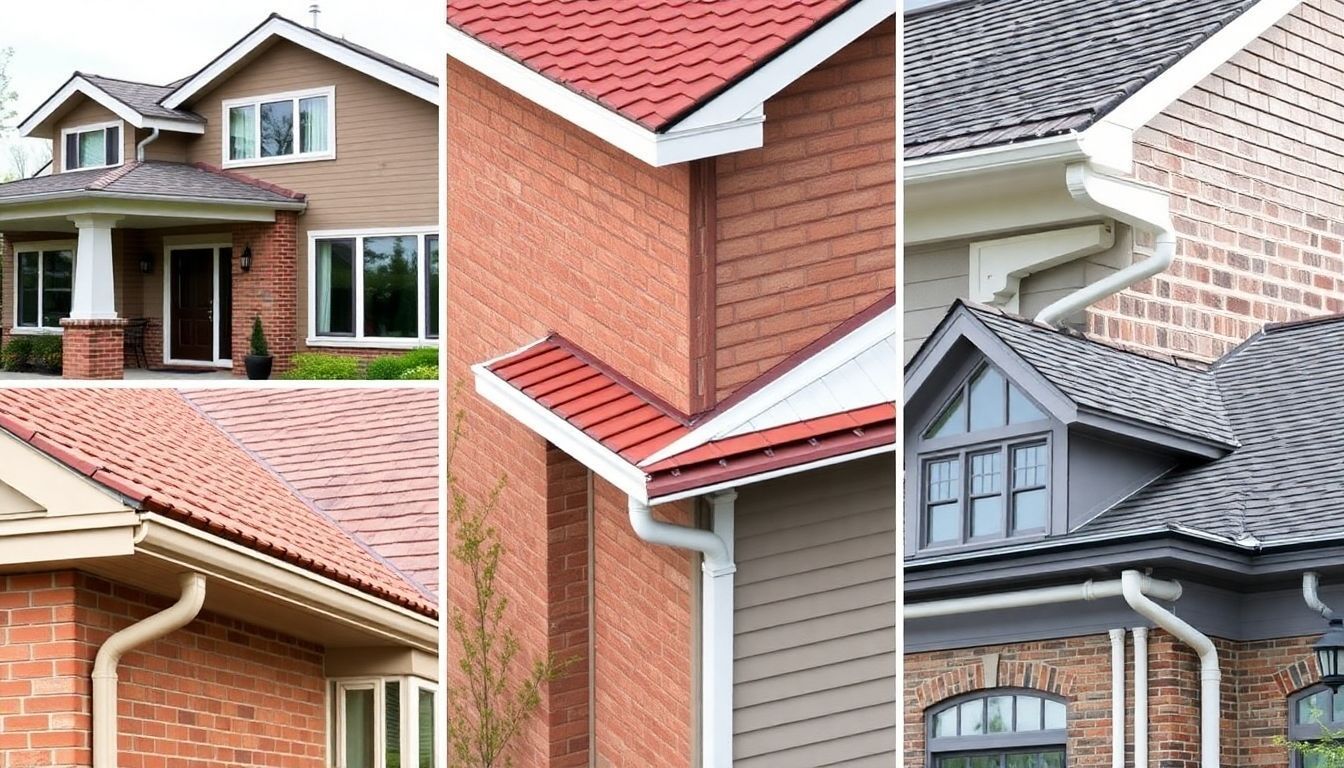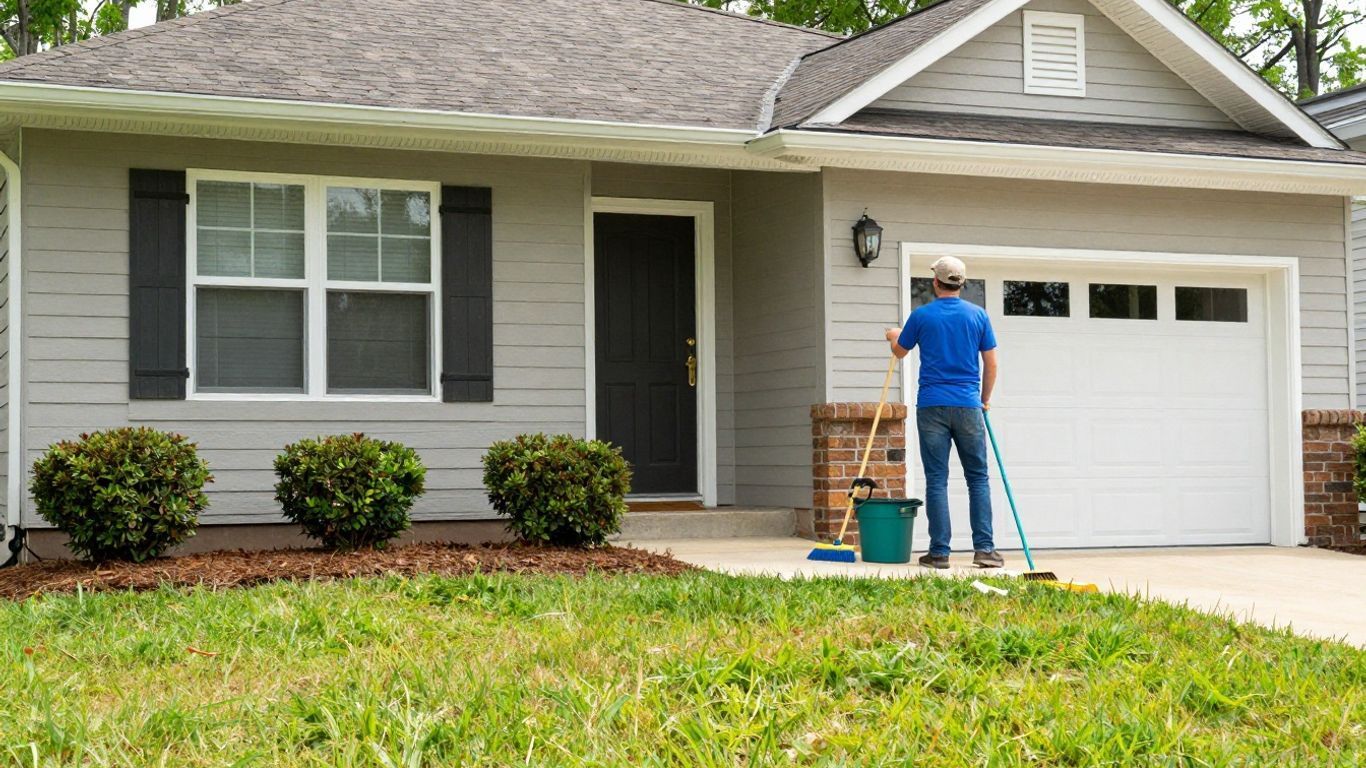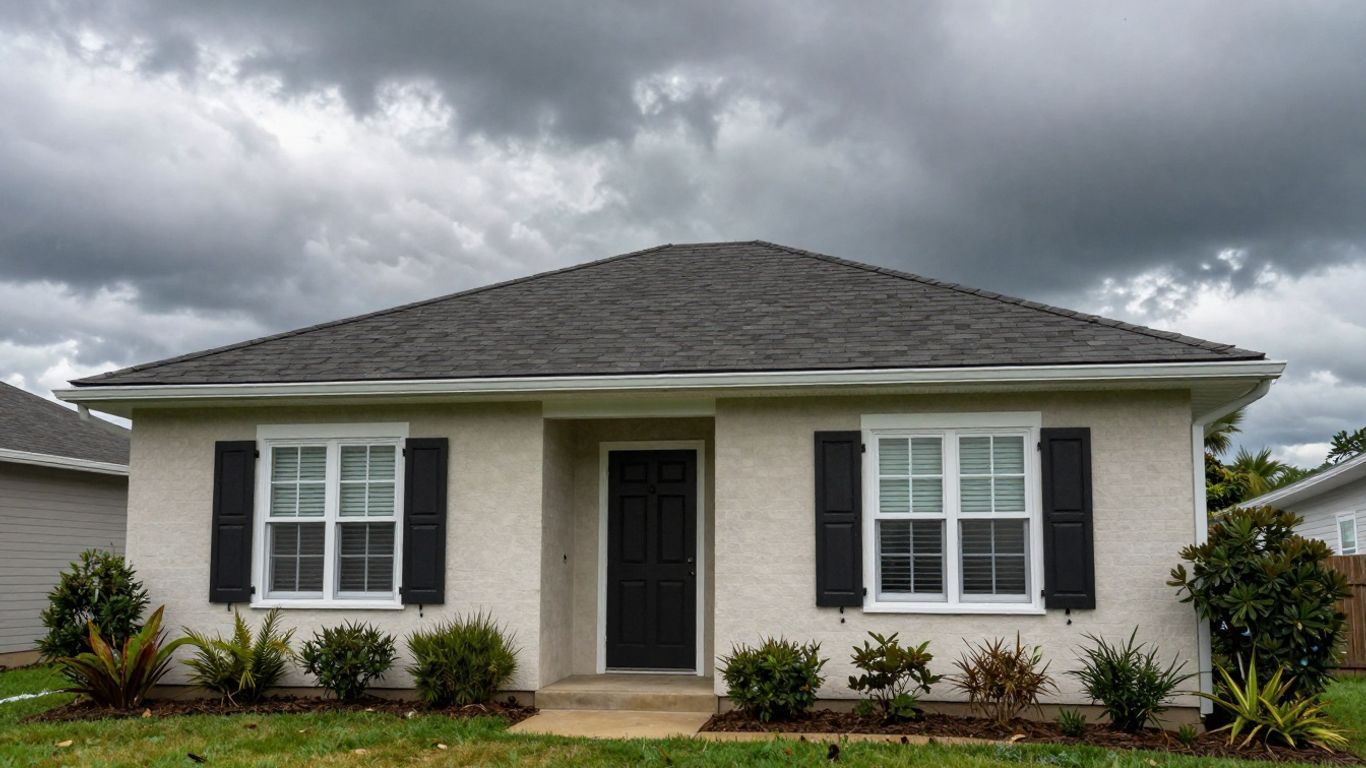Choosing the Right Gutter System for Homes in Chickamauga, Rock Springs & Across NW GA

When it comes to protecting your home from water damage, choosing the right gutter system is key. In places like Chickamauga, Rock Springs, and throughout NW Georgia, homeowners have a lot of options. With the local climate and building styles in mind, it’s important to find a gutter system that not only fits your home but also keeps it safe from the elements. Let’s break down what you need to know about selecting the best gutter systems for your needs.
Key Takeaways
- Understand the different types of gutter systems available.
- Consider your local climate when choosing gutters.
- Choose materials that match your home’s design.
- Regular maintenance can extend the life of your gutters.
- Consult with local experts to find the best options.
Understanding Gutter Systems For Your Home
Types Of Gutter Systems
Okay, so you're thinking about gutters. There are actually a bunch of different types out there, and it's not just about picking the one that looks the coolest. You've got your standard sectional gutters, which are probably what you picture when you think of gutters – they come in pieces and you connect them. Then there are seamless gutters, which are made from one continuous piece of material, cut to the exact length of your roof. There are also some less common types like half-round gutters, which, as the name suggests, are shaped like a half-circle, and box gutters, which are built into the roof structure itself. Each type has its pros and cons, depending on your house and your budget.
Benefits Of Proper Gutter Installation
Properly installed gutters are super important for protecting your home. I mean, think about it: all that rainwater has to go somewhere. If it's not directed away from your foundation, you could end up with some serious water damage. We're talking about things like basement flooding, foundation cracks, and even mold growth. Plus, gutters help prevent soil erosion around your house and can even protect your siding from getting stained or damaged by water runoff. It's really an investment in the long-term health of your home.
Here's a quick rundown:
- Prevents foundation damage
- Protects siding and paint
- Reduces soil erosion
Common Gutter Materials
Gutters come in all sorts of materials, each with its own set of advantages and disadvantages. Vinyl gutters are a popular choice because they're relatively inexpensive and easy to install. Aluminum gutters are another common option – they're lightweight, rust-resistant, and come in a variety of colors. Steel gutters are stronger than aluminum but can be prone to rusting if not properly coated. And then there are copper gutters, which are the most expensive but also the most durable and aesthetically pleasing. Choosing the right material depends on your budget, your climate, and your personal preferences.
Picking the right material is a balancing act. You need to consider cost, durability, and how it looks with your house. Don't just go for the cheapest option without thinking about how long it will last or how well it will hold up in the weather we get around here.
Factors To Consider When Choosing Gutters
Choosing the right gutters isn't just about picking something that looks nice; it's about making sure your home is protected from water damage. There are several things to keep in mind to make the best choice for your property. Let's break it down.
Climate Considerations
Living in Chickamauga, Rock Springs, or anywhere in Northwest Georgia means dealing with some pretty specific weather. We get our fair share of rain, and sometimes even some ice during the winter. Your gutters need to be able to handle all of that. Think about how much rainfall we typically get during the wettest months and choose a gutter system that can manage that volume. Also, consider how the temperature changes might affect the material over time – some materials expand and contract more than others, which can lead to leaks or damage.
Roof Design Compatibility
Not all roofs are created equal, and your gutter system needs to work well with your roof's design. The pitch of your roof, the type of roofing material, and the overall shape all play a role in determining the best gutter style and placement. For example, if you have a steep roof, you might need wider gutters or more downspouts to handle the increased water runoff. Also, consider the overhang of your roof – if it's minimal, you'll need to make sure the gutters are installed precisely to catch the water effectively.
Home Aesthetics
Gutters are functional, but they're also visible, so you want them to complement your home's style. There are many different styles and colors available, so you can find something that blends in or even adds to your home's curb appeal. Consider the architectural style of your house – a modern home might look great with sleek, minimalist gutters, while a more traditional home might benefit from classic half-round gutters. Don't underestimate the impact of color either; choosing a color that matches your trim or siding can make a big difference.
Choosing the right gutters involves balancing functionality with aesthetics. It's about finding a system that not only protects your home from water damage but also enhances its overall appearance. Take the time to consider all these factors, and you'll be much happier with the final result.
Top Gutter System Options In Chickamauga
Choosing the right gutter system can feel overwhelming, especially with so many options available. Here in Chickamauga, we've got a few favorites that hold up well to our weather and common home styles. Let's break down some of the top contenders.
Seamless Gutters
Seamless gutters are a popular choice, and for good reason. They're custom-made on-site to fit your home's exact dimensions, which means fewer seams and a lower risk of leaks. This is a big plus because leaks can lead to water damage and all sorts of headaches down the road. They tend to be a bit pricier upfront, but the reduced maintenance and longer lifespan often make them a worthwhile investment. Plus, they look really clean and modern.
- Reduced risk of leaks
- Custom fit for your home
- Aesthetically pleasing
K-Style Gutters
K-style gutters are probably what you picture when you think of gutters. They're called K-style because, well, they kind of look like the letter "K" from the side. They're a very common choice, and you'll see them on tons of houses around here. One of the main reasons for their popularity is that they can hold a good amount of water, which is important during our heavy rains. They're also relatively easy to install and come in a variety of materials, so you can find something that fits your budget and style. If you're looking for lawn care providers in Ringgold, GA, you might want to consider K-style gutters.
Half-Round Gutters
Half-round gutters have a classic, traditional look. They're exactly what they sound like – half a circle. While they might not hold as much water as K-style gutters, they're known for being really good at shedding debris. This means less clogging and less frequent cleaning. They're often chosen for older homes or homes with a more historical architectural style. They can be a bit more expensive to install than K-style, but their clean design and efficient water flow make them a solid option. Consider half-round gutters if you want a classic look.
Choosing the right gutter system really depends on your specific needs and preferences. Think about your budget, the style of your home, and how much maintenance you're willing to do. It's always a good idea to get a few quotes from local installers to get a better sense of what's best for your situation.
Maintenance Tips For Gutter Systems
Regular Cleaning Practices
Okay, so you've got gutters. Great! Now you actually have to, you know, maintain them. It's not a set-it-and-forget-it kind of deal. Think of it like this: neglecting your gutters is like ignoring that weird noise your car is making – it's only going to get worse (and more expensive) over time. The most important thing you can do is clean your gutters regularly.
Here's a simple checklist:
- Clear out leaves and debris at least twice a year (spring and fall are good times).
- Use a ladder safely! Seriously, don't be a statistic. Get a sturdy ladder and have someone spot you.
- Consider using gutter guards to reduce the amount of debris that gets in there in the first place. It's not a perfect solution, but it helps.
- Flush the gutters with a garden hose to make sure water flows freely to the downspout.
Signs Of Gutter Damage
Gutters aren't indestructible. Keep an eye out for these warning signs:
- Sagging gutters: This usually means they're full of water and debris, or the hangers are failing.
- Rust or corrosion: Especially common with metal gutters. Time for a repair or replacement.
- Leaks: Obvious, but check for drips and water stains around the gutters.
- Separation at the seams: Gutters are installed in sections, and those sections can come apart over time.
- Water damage to your home's foundation: This could be a sign that your gutters aren't doing their job of directing water away from your house.
When To Call A Professional
Sometimes, DIY just isn't enough. Know when to throw in the towel and call in the pros. If you notice any of the following, it's time to get some expert help:
- Extensive damage: If your gutters are severely damaged, rusted through, or pulling away from the house, it's best to have them professionally repaired or replaced.
- You're not comfortable working on a ladder: Safety first! Don't risk a fall.
- You suspect structural damage to your home: If you see signs of water damage to your fascia, soffit, or foundation, a professional can assess the situation and recommend the best course of action.
- You just don't have the time or inclination: Let's be honest, gutter maintenance isn't exactly fun. If you'd rather spend your weekends doing something else, hire someone to take care of it for you.
Ignoring your gutters can lead to bigger problems down the road, like foundation damage, roof leaks, and even pest infestations. A little bit of maintenance can save you a lot of money and headaches in the long run.
Cost Considerations For Gutter Installation
Budgeting For Gutter Systems
Okay, so you're thinking about new gutters. Great! But let's talk money. Figuring out your budget before you even start looking is super important. It's easy to get caught up in all the fancy options, but knowing what you can realistically spend will keep you grounded. Think about it like this: are you looking for the most basic, functional gutters, or are you willing to invest in something that will last longer and look nicer? Your budget will influence the type of material you choose, the complexity of the installation, and whether you can afford extras like gutter guards.
Comparing Material Costs
Different gutter materials come with different price tags. Vinyl is usually the cheapest option upfront, but it might not last as long as other materials. Aluminum is a good middle-ground – it's more durable than vinyl but still relatively affordable. Steel and copper are the pricier choices, but they offer superior durability and can add to your home's curb appeal. Don't forget to factor in the cost of installation, which can vary depending on the material and the complexity of the job. Also, consider these points:
- Material lifespan
- Installation costs
- Maintenance requirements
Long-Term Savings With Quality Gutters
It might be tempting to go with the cheapest gutter option to save money upfront, but that could end up costing you more in the long run. Cheaper materials might need to be replaced sooner, and they might not protect your home as effectively from water damage. Investing in quality gutters can save you money on repairs and replacements down the road. Plus, properly functioning gutters can prevent costly problems like foundation damage, siding rot, and landscape erosion. Think of it as an investment in your home's long-term health and value. You can also look into lawn care services to keep your yard in tip-top shape.
Choosing the right gutters isn't just about immediate cost; it's about the total cost of ownership. Consider the lifespan of the material, the potential for repairs, and the impact on your home's value. A slightly higher initial investment can often lead to significant savings over time.
Local Regulations And Gutter Installation
Building Codes In Chickamauga
Okay, so you're thinking about new gutters. Awesome! But before you jump in, you gotta check out the local building codes. Chickamauga, like any other city, has rules about how things need to be built and installed. These codes are in place to make sure everything is safe and up to standard. You don't want to put in new gutters only to find out they don't meet code and you have to redo the whole thing. Trust me, that's a headache you can avoid. Check with the city's planning or building department. They can give you the lowdown on what's allowed and what's not. It's always better to be safe than sorry, especially when it comes to something as important as your home's drainage system. You can also check the personal property tax to see if there are any additional regulations.
Permits Required For Installation
So, you've checked the building codes, great! Now, does your gutter project need a permit? Sometimes, even if your project meets code, you still need to get a permit before you start. This is especially true for bigger projects or if you're making changes that affect the structure of your house. Getting a permit usually involves filling out some paperwork and submitting it to the city. They might also want to inspect the work to make sure it's done right. It might seem like a pain, but it's there to protect you and your neighbors. Plus, doing work without a permit can lead to fines or even having to tear down what you've built. Here's a quick checklist:
- Check with the city's building department.
- Fill out the necessary paperwork.
- Schedule an inspection if required.
Getting the right permits isn't just about following the rules; it's about ensuring your home improvement project is safe, compliant, and adds value to your property without future legal or structural issues.
Impact Of Local Weather Patterns
Living in Northwest Georgia, we all know the weather can be a bit wild. From heavy rains to the occasional ice storm, our gutters have to put up with a lot. That's why it's super important to think about the local weather patterns when you're choosing your gutter system. For example, if you live in an area that gets a lot of rain, you'll want gutters that can handle a high volume of water. Larger gutters or systems with better drainage might be a good idea. And if you're in an area prone to ice, you might want to consider gutters that are less likely to get damaged by freezing water. Think about these things:
- Average rainfall in your area
- Frequency of ice storms
- Potential for debris buildup from nearby trees
Choosing The Best Gutter System For Your Needs
Assessing Your Home's Needs
Okay, so you've made it this far, which means you're serious about getting the right gutters. Good for you! It's not exactly the most thrilling home improvement project, but it's super important. First things first, take a good, hard look at your house. What kind of roof do you have? How much rain does your area actually get? Is your yard prone to flooding? These are all important questions to ask yourself. Think about the volume of water your gutters will need to handle.
- Consider the square footage of your roof.
- Note any areas where water tends to pool.
- Check for existing water damage around your foundation.
Consulting With Local Experts
Don't be afraid to get a second opinion (or a third!). Talking to local gutter installation companies can be a game-changer. They know the area, they know the common problems, and they can offer advice tailored to your specific situation. Plus, they can point out things you might have missed. I know, talking to contractors can be a pain, but trust me, it's worth it. They can help you avoid costly mistakes down the road. Getting professional advice is invaluable.
Evaluating Warranty Options
Gutters are an investment, so you want to make sure they're protected. Pay close attention to the warranty offered by the manufacturer and the installer. What does it cover? How long does it last? What are the conditions? A good warranty can give you peace of mind knowing that you're covered if something goes wrong. Read the fine print, ask questions, and don't be afraid to negotiate. It's your house, your money, and your responsibility to make sure you're getting the best deal possible.
Choosing the right gutter system is a big decision. Take your time, do your research, and don't be afraid to ask for help. A little bit of effort now can save you a lot of headaches (and money) later on.
When it comes to picking the right gutter system for your home, it’s important to consider your specific needs. Different homes have different requirements based on their location, size, and style. Take the time to explore your options and find a system that works best for you. For more tips and guidance, visit our website today!
Wrapping It Up
In the end, picking the right gutter system for your home in Chickamauga, Rock Springs, and the rest of NW GA doesn’t have to be a headache. Just remember to think about your specific needs, the local weather, and your budget. Whether you go for seamless gutters, traditional ones, or something in between, make sure you do your homework. Talk to local pros, read reviews, and don’t rush the decision. A good gutter system can save you a lot of trouble down the road, so take your time and choose wisely.
Frequently Asked Questions
What are the different types of gutter systems available?
There are several types of gutter systems, including seamless gutters, K-style gutters, and half-round gutters. Each type has its own features and benefits.
Why is it important to have a proper gutter installation?
Having the right gutter installation helps prevent water damage to your home. It directs rainwater away from your roof and foundation, which can save you money on repairs.
What materials are commonly used for gutters?
Common materials for gutters include aluminum, vinyl, copper, and steel. Each material has its own pros and cons, like cost and durability.
How does the climate affect my choice of gutters?
In areas with heavy rain or snow, you might need stronger gutters that can handle the extra water. Local weather patterns can help determine the best type for your home.
What signs indicate that my gutters are damaged?
Look for signs like water spilling over the edges, rust spots, or sagging. These can mean your gutters need repair or replacement.
When should I hire a professional for gutter work?
If you're unsure about the condition of your gutters or if you notice serious damage, it's best to call a professional. They can assess the situation and make necessary repairs.


